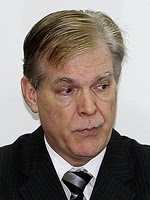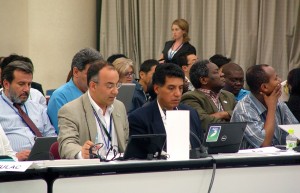Ainda estão abertas questões fundamentais, como incluir (ou excluir) da participação nos benefícios os recursos genéticos levados de países de origem desde os tempos do colonialismo. Não são pontos menores, mas parece haver ainda boas possibilidades de entrar em um acordo com critérios benéficos para os países -- e os povos -- de origem. Os próximos dias dirão.
Intellectual Property Watch
24 October 2010
24 October 2010
Negotiators Persist On Biodiversity Benefit-Sharing Treaty Despite Slipping Deadlines
By Catherine Saez @ 3:29 pm NAGOYA, JAPAN – The monumental statue in the courtyard of the Nagoya Congress Center, featuring a warrior on his horse, could be an illustration of the work of the group of officials charged with negotiating a much-anticipated international treaty to protect genetic resources from misappropriation and justly reward provider countries. Meeting over the weekend, they could not find consensus on the text and will have to request another deadline from the United Nations meeting on biodiversity on Monday.
NAGOYA, JAPAN – The monumental statue in the courtyard of the Nagoya Congress Center, featuring a warrior on his horse, could be an illustration of the work of the group of officials charged with negotiating a much-anticipated international treaty to protect genetic resources from misappropriation and justly reward provider countries. Meeting over the weekend, they could not find consensus on the text and will have to request another deadline from the United Nations meeting on biodiversity on Monday.The Informal Consultative Group (ICG) negotiating a draft of the international protocol on access and benefit sharing (ABS) met over the weekend after being given a extended negotiating mandate from the plenary session on Friday.
The 10th Conference of the Parties (COP 10) of the 1992 Convention on Biological Diversity (CBD) is meeting from 18-29 October and the adoption of the ABS protocol is one of the big expectations of the meeting.
On Saturday, the ICG resumed work with the co-chairs, Fernando Casas of Colombia and Timothy Hodges of Canada, asking small groups to focus on specific issues. On Saturday, negotiators met on utilisation and derivatives of genetic resources, and access, and today they tried to find consensus on the scope of the protocol and on compliance.
Today, small groups reported to the ICG on their work. The small group working on scope said some progress had been made, modifying paragraphs and simplifying options. However, some areas of disagreement persisted, the chair of the small group reported, with problems related to the temporal scope of the protocol. This has been a recurring issue with some countries wanting the measures of the protocol applying from the date of the adoption, and some countries wanting the protocol to have a retroactive effect, applying to genetic resources acquired before the adoption of the protocol. Some issues are also related to the jurisdictional scope of the protocol, he said.
The small group on compliance reported that substantial progress was achieved on Article 14 (compliance with mutually agreed terms), in particular, on Article 14.3 (effective measures) and Article 14.4 (the effectiveness of Article 14 having to be reviewed by the COP). Clean text on those articles should be reached very quickly as only one party was still consulting on one specific bracket, said the chair of small group. Little work could be achieved on Article 13 (Monitoring, tracking and reporting the utilization of genetic resources and associated traditional knowledge).
Efforts in the small group on compliance were to continue into the evening in hopes of making as much progress as possible before the plenary session reconvenes on Monday. The ICG is expected to report to the plenary on progress and ask for more time.A “friends of the issue of utilisation/derivatives” was also constituted and was to meet the co-chairs in private later today. Among countries summoned were: Brazil, Canada, Colombia, European Union, India, Indonesia, Iran, Japan, Mexico and Switzerland.
Hodges instructed the countries discuss and agree on a potential solution on utilisation and derivatives and “try to make clear among you how to move forward,” he said.
On Monday, the COP plenary will hold a short session, solely devoted to the progress made on the text of the protocol and discuss what to do. But Hodges said, “It is clear” that the job will not be finished by then, and he will recommend that the ICG pursue its work. The ICG is the right body to finalise the text, he said.
If the plenary agrees to extend the mandate of the ICG, work will resume right after the plenary, Hodges said.
“We need to consider the arrival of the ministers,” later in the week, Hodges said. Some countries believe that ministers can help out, he said.
A legal drafting group for the protocol text was to be determined later today.
Temporal Scope of the Protocol
According to François Meienberg from the Berne Declaration, and Christine von Weizsäcker from Ecoropa, “one of the main unresolved issues in the ABS protocol negotiations are genetic resources held ex-situ,” outside of its original region, they said in a release.
A major portion of genetic resources have already been taken from the countries of origin over the past 400 years, and are kept in several institutions, such as botanical gardens, research institutions, genetic resource broker companies, they said.
The question they are asking is “will we share the benefits arising out of the utilisation of these resources or will the new protocol legitimise the biopiracy which has occurred since the time of colonisation.”
Botanical gardens are showing the way, according to Meienberg and von Weizsäcker, with the principles of Botanic Gardens Conservation International, which mention sharing benefits arising from the use of genetic resources acquired prior to the entry into force of the CBD.
The major concern, the release said, is that users would “examine ex-situ collections in their own country or in non-Parties or will check if the resource is available in the open market. If a user has illegally accessed a genetic resource in a country of origin, he will pretend that he legally found it ex-situ.”
Catherine Saez may be reached at csaez@ip-watch.ch.


Nenhum comentário:
Postar um comentário